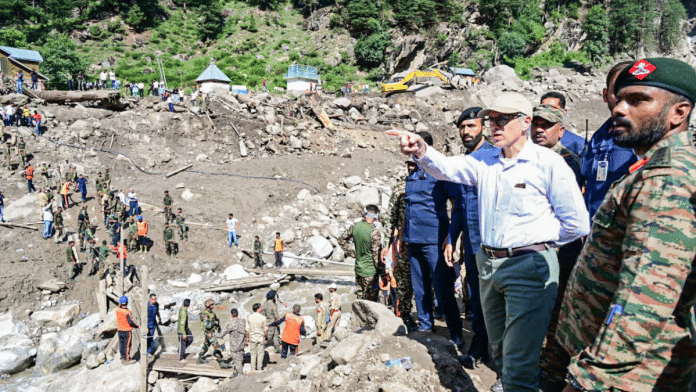New Delhi: The Indian High Commission in Islamabad Sunday alerted Pakistan about “possible flooding” in the country following widespread heavy rains across Jammu and Kashmir. The normal mechanism for sharing such information is through the Indus Waters Commission which is not in operation with the IWT in abeyance since the Pahalgam terror attack.
A person familiar with the matter informed ThePrint that “the communication has been made entirely on humanitarian grounds. The communication was made by the Indian High Commission in Islamabad to the Pakistani foreign ministry on the matter”.
The warning was communicated as heavy rains pounded Jammu and Kashmir over the weekend. The India Meteorological Department Sunday issued an orange alert for all districts in the union territory as heavy rains battered Jammu and Kashmir and triggered a flood-like situation in the low-lying areas.
The rains in the union territory have seen key infrastructure including a bridge in Kathua collapsing. Landslides have blocked roads across Jammu and Kashmir, with parts of the Jammu city inundated following the weekend rains. At least a dozen vehicles were swept away through flash floods.
IWT in abeyance
In the aftermath of the Pahalgam terrorist attack in Jammu and Kashmir 22 April, New Delhi had announced the Indus Waters Treaty (IWT) of 1960 will be kept in abeyance until Islamabad abjures its support for cross-border terrorism. The terrorist attack on 22 April left 26 people dead.
The IWT remained a cornerstone of ties, surviving a number of wars and conflicts until the Pahalgam attack. India launched Operation Sindoor on 7 May, targeting 10 terrorist complexes across Pakistan-occupied Jammu and Kashmir and Pakistan, including Bahawalpur and Muridke.
On 10 May, both militaries reached an understanding for the pausing of hostilities, bringing the 87-hour conflict to a close. However, ties between India and Pakistan are at a nadir. The information of a potential flood has been communicated keeping in mind the humanitarian costs involved.
At least 700 people have been killed in Pakistan since June due to floods triggered by the monsoons. Khyber Pakhtunkhwa (KPK), the North-Western province in Pakistan, has been hit the hardest, according to the United Nations.
At least 978 people have been injured, while 2,400 houses have been damaged or destroyed as of 21 August. Around 368 people were left dead in KPK following torrential rains between 15 to 19 August. At least 21 of the dead in KPK were children according to UNICEF.
Karachi, Pakistan’s financial capital was flooded on 19 August following heavy rains. At least 10 people were killed in Karachi that day, according to reports. In 2022, unprecedented floods across Pakistan left at least 1,700 people dead and caused an estimated damage of at least $40 billion, according to the UN.
(Edited by Ajeet Tiwari)
Also Read: Jal Shakti Minister Paatil reaffirms position on IWT, revival of Tulbul project






